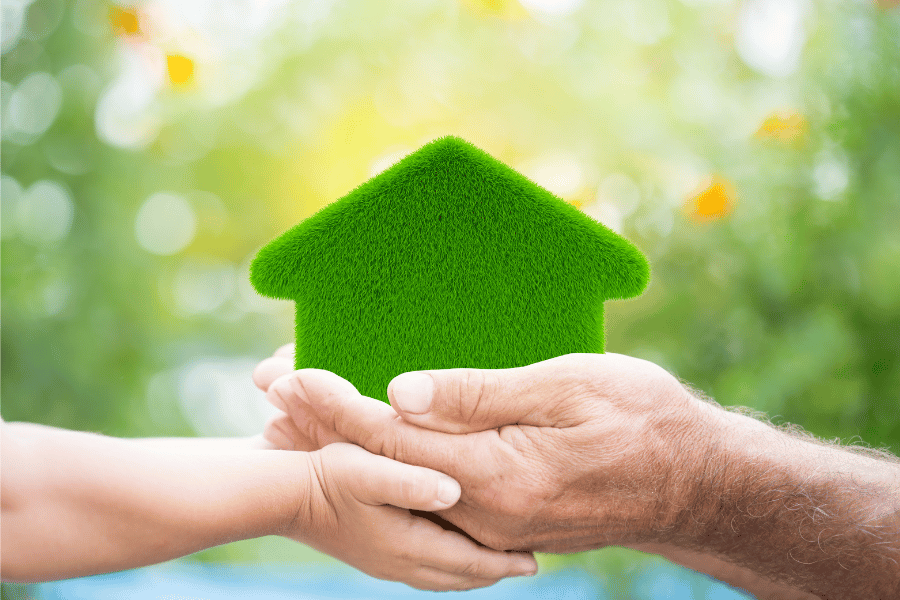As homeowners, it’s essential to recognize the significant role our homes play in the broader environmental picture. At the heart of our comfort, yet often overlooked, is the HVAC (Heating, Ventilation, and Air Conditioning) system. Understanding its environmental impact and taking steps to reduce its carbon footprint is not only beneficial for the planet but can also enhance our home’s efficiency and comfort.

HVAC and the Environment
Your HVAC system, while ensuring your home is cozy and comfortable, can have a notable environmental impact. The primary issues stem from energy consumption and refrigerant usage. Most HVAC systems rely heavily on electricity, and depending on your energy source, this could mean a significant amount of carbon emissions. Additionally, many older systems use refrigerants that, if leaked, can be potent greenhouse gases.
Energy Consumption – The Double-Edged Sword
Energy consumption is the most significant way your HVAC impacts the environment. In areas like Georgetown, Cedar Park, and Round Rock, where the climate can vary, HVAC systems work hard to maintain a comfortable home environment. The Department of Energy estimates that heating and cooling account for about half of the average home’s total energy usage. The type of system, its age, and maintenance practices all play a role in how much energy it consumes.
Refrigerants – Silent but Potent
Older HVAC systems often use refrigerants like Freon (R-22), which are harmful to the ozone layer and contribute to global warming. The good news is that newer, more environmentally friendly refrigerants are being used in modern HVAC systems. However, it’s crucial to ensure that these systems are properly maintained to prevent leaks.
Reducing Your HVAC’s Environmental Impact
1. Regular Maintenance
Regular maintenance is key. This includes cleaning and replacing filters, checking for refrigerant leaks, and ensuring all components are functioning efficiently. A well-maintained system uses less energy, which translates to lower carbon emissions and reduced utility bills.
2. Energy-Efficient Upgrades
Consider upgrading to an energy-efficient HVAC system. Look for systems with a high SEER (Seasonal Energy Efficiency Ratio) rating. These systems use less energy to produce the same amount of heating or cooling, reducing your carbon footprint.
3. Smart Thermostats
Smart thermostats can make a big difference. They optimize your HVAC usage by learning your schedule and preferences, ensuring that you’re not heating or cooling an empty house. This smart technology can significantly reduce energy consumption.
4. Insulation and Sealing
Improving your home’s insulation and sealing leaks can dramatically reduce the need for heating and cooling. This means your HVAC system doesn’t have to work as hard, saving energy and reducing wear and tear.
5. Consider Alternative Energy Sources
If possible, explore alternative energy sources like solar panels. They can power your HVAC system, substantially reducing your reliance on non-renewable energy sources.
Your Role in a Greener Future
By understanding the environmental impact of your HVAC system and taking steps to reduce it, you’re not just saving on your energy bill; you’re contributing to a healthier planet. These actions, though seemingly small, add up to a significant impact when adopted widely.
In communities like Georgetown, Leander, and Liberty Hill, every homeowner who takes these steps helps create a more sustainable, environmentally friendly neighborhood. Together, we can ensure our comfort doesn’t come at the cost of our planet’s health.
Remember, reducing your HVAC system’s environmental impact is a continuous journey, not a one-time fix. Regular maintenance, energy-efficient upgrades, and a commitment to sustainable practices can make your home a beacon of environmental responsibility in Texas. Let’s embrace these changes for a greener, more sustainable future!
If you are experiencing a problem with your air conditioning or heating call us at 512-336-1431 to schedule an appointment. We’ll be glad to come out and take a look at the issue.
1431-183 A/C & Heating proudly serves Round Rock, Georgetown, Cedar Park, Pflugerville, Leander, Liberty Hill, and North Austin.
